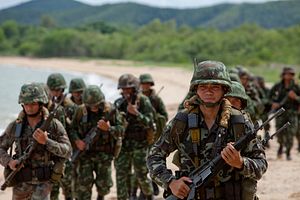Last week, the Royal Thai Army disclosed that it would move forward with a new combat vehicle deal with the United States. The development put the spotlight on the ongoing security collaboration between the United States and Thailand within the broader relationship and amid a range of domestic and regional developments for both sides.
As I have observed previously, the United States and Thailand, both treaty allies, have a range of engagements in the defense side of their relationship. This includes not only bilateral components that are in usual relationships such as visits and exchanges, but also multilateral exercises such as Cobra Gold and periodic access for the U.S. military during regional contingencies.
Amid some changes over the past few years, including the election of U.S. President Donald Trump and Thailand’s navigation of its post-May 2014 coup environment, which includes the recent holding of elections, defense interactions between Washington and Bangkok have continued and in some cases even accelerated, in spite of challenges that remain both for the alliance and within the wider Indo-Pacific region. Within that context, developments on the defense side have continued into 2019 as well, including exercises such as Hanuman Guardian and Cobra Gold.
Last week, this aspect of the U.S.-Thailand alliance was in the headlines with the official articulation of the fact that Thailand would move forward with another procurement of defense equipment. The Royal Thai Army announced on May 14 that it had placed a bid to procure the M1126 Stryker 8×8 infantry combat vehicle (ICV) produced by General Dynamics Land Systems.
As of now, the deal is set to see the RTA’s purchase of 37 vehicles for 2.96 billion Thai baht (about $94 million), along with an additional 23 units that would be funded with U.S. military assistance coming from the Foreign Military Sales (FMS) mechanism. The deal includes the vehicles along with weapons and communications systems, spare parts, and training to support maintenance and repair. As of now, the first batch of Stryker ICVs is expected to arrive in Thailand by late 2019, and they are expected to be sent to the 11th Infantry Division, which is based in Chachoengsao.
The deal itself is another manifestation of several within the defense aspect of the relationship between the two sides. And while the official account publicly disclosed by the RTA did not itself indicate this, an anonymous army source was quoted as telling The Bangkok Post that there was additional significance as well, including the fact that Thailand was the first country that this was sold to and that Bangkok had chosen to ultimately secure a deal with the United States instead of China which it had considered earlier.
To be sure, this is just one of several developments within the defense aspect of the U.S.-Thailand alliance, and, as mentioned above, there are several elements of uncertainty about the future direction of ties moving forward. Nonetheless, the deal reinforced some of the ongoing activity that continues in the military realm of the relationship in spite of these uncertainties, and its progress will be one among several developments to watch to assess the trajectory of the U.S.-Thailand alliance moving forward.

































